- Home
- Emile Gaboriau
Le dossier no. 113. English Page 2
Le dossier no. 113. English Read online
Page 2
III
If there is one man in the world whom no event can move or surprise, whois always on his guard against deceptive appearances, and is capableof admitting everything and explaining everything, it certainly is aParisian commissary of police.
While the judge, from his lofty place, applies the code to the factssubmitted to him, the commissary of police observes and watches allthe odious circumstances that the law cannot reach. He is perforce theconfidant of disgraceful details, domestic crimes, and tolerated vices.
If, when he entered upon his office, he had any illusions, before theend of a year they were all dissipated.
If he does not absolutely despise the human race, it is because often,side by side with abominations indulged in with impunity, he discoverssublime generosities which remain unrewarded.
He sees impudent scoundrels filching public respect; and he consoleshimself by thinking of the modest, obscure heroes whom he has alsoencountered.
So often have his previsions been deceived, that he has reached a stateof complete scepticism. He believes in nothing, neither in evil nor inabsolute good; not more in virtue than in vice.
His experience has forced him to come to the sad conclusion that notmen, but events, are worth considering.
The commissary sent for by M. Fauvel soon made his appearance.
It was with a calm air, if not one of perfect indifference, that heentered the office.
He was followed by a short man dressed in a full suit of black, whichwas slightly relieved by a crumpled collar.
The banker, scarcely bowing to him, said:
"Doubtless, monsieur, you have been apprised of the painful circumstancewhich compels me to have recourse to your assistance?"
"It is about a robbery, I believe."
"Yes; an infamous and mysterious robbery committed in this office,from the safe you see open there, of which my cashier" (he pointed toProsper) "alone possesses the key and the word."
This declaration seemed to arouse the unfortunate cashier from his dullstupor.
"Excuse me, monsieur," he said to the commissary in a low tone. "Mychief also has the word and the key."
"Of course, that is understood."
The commissary at once drew his own conclusions.
Evidently these two men accused each other.
From their own statements, one or the other was guilty.
One was the head of an important bank: the other was a simple cashier.
One was the chief: the other was the clerk.
But the commissary of police was too well skilled in concealing hisimpressions to betray his thoughts by any outward sign. Not a muscle ofhis face moved.
But he became more grave, and alternately watched the cashier and M.Fauvel, as if trying to draw some profitable conclusion from theirbehavior.
Prosper was very pale and dejected. He had dropped into a seat, and hisarms hung inert on either side of the chair.
The banker, on the contrary, remained standing with flashing eyes andcrimson face, expressing himself with extraordinary violence.
"And the importance of the theft is immense," continued M. Fauvel; "theyhave taken a fortune, three hundred and fifty thousand francs. Thisrobbery might have had the most disastrous consequences. In timeslike these, the want of this sum might compromise the credit of thewealthiest banking-house in Paris."
"I believe so, if notes fall due."
"Well, monsieur, I had this very day a heavy payment to make."
"Ah, really!"
There was no mistaking the commissary's tone; a suspicion, the first,had evidently entered his mind.
The banker understood it; he started, and said, quickly:
"I met the demand, but at the cost of a disagreeable sacrifice. I oughtto add further that, if my orders had been obeyed, the three hundred andfifty thousand francs would not have been in."
"How is that?"
"I never desire to have large sums of money in my house over-night. Mycashier had positive orders to wait always until the last moment beforedrawing money from the Bank of France. I above all forbade him to leavemoney in the safe over-night."
"You hear this?" said the commissary to Prosper.
"Yes, monsieur," replied the cashier, "M. Fauvel's statement is quitecorrect."
After this explanation, the suspicions of the commissary, instead ofbeing strengthened, were dissipated.
"Well," he said, "a robbery has been perpetrated, but by whom? Did therobber enter from without?"
The banker hesitated a moment.
"I think not," he said at last.
"And I am certain he did not," said Prosper.
The commissary expected and was prepared for those answers; but it didnot suit his purpose to follow them up immediately.
"However," said he, "we must make ourselves sure of it." Turning towardhis companion:
"M. Fanferlot," he said, "go and see if you cannot discover some tracesthat may have escaped the attention of these gentlemen."
M. Fanferlot, nicknamed the Squirrel, was indebted to his prodigiousagility for this title, of which he was not a little proud. Slim andinsignificant in appearance he might, in spite of his iron muscles, betaken for a bailiff's under clerk, as he walked along buttoned up to thechin in his thin black overcoat. He had one of those faces that impressus disagreeably--an odiously turned-up nose, thin lips, and little,restless black eyes.
Fanferlot, who had been on the police force for five years, burned todistinguish himself, to make for himself a name. He was ambitious. Alas!he was unsuccessful, lacking opportunity--or genius.
Already, before the commissary spoke to him, he had ferreted everywhere;studied the doors, sounded the partitions, examined the wicket, andstirred up the ashes in the fireplace.
"I cannot imagine," said he, "how a stranger could have effected anentrance here."
He walked around the office.
"Is this door closed at night?" he inquired.
"It is always locked."
"And who keeps the key?"
"The office-boy, to whom I always give it in charge before leaving thebank," said Prosper.
"This boy," said M. Fauvel, "sleeps in the outer room on asofa-bedstead, which he unfolds at night, and folds up in the morning."
"Is he here now?" inquired the commissary.
"Yes, monsieur," answered the banker.
He opened the door and called:
"Anselme!"
This boy was the favorite servant of M. Fauvel, and had lived with himfor ten years. He knew that he would not be suspected; but the idea ofbeing connected in any way with a robbery is terrible, and he enteredthe room trembling like a leaf.
"Did you sleep in the next room last night?" asked the commissary.
"Yes, monsieur, as usual."
"At what hour did you go to bed?"
"About half-past ten; I had spent the evening at a cafe near by, withmonsieur's valet."
"Did you hear no noise during the night?"
"Not a sound; and still I sleep so lightly, that, if monsieur comes downto the cash-room when I am asleep, I am instantly awakened by the soundof his footsteps."
"Monsieur Fauvel often comes to the cash-room at night, does he?"
"No, monsieur; very seldom."
"Did he come last night?"
"No, monsieur, I am very certain he did not; for I was kept awake nearlyall night by the strong coffee I had drunk with the valet."
"That will do; you can retire," said the commissary.
When Anselme had left the room, Fanferlot resumed his search. He openedthe door of the private staircase.
"Where do these stairs lead to?" he asked.
"To my private office," replied M. Fauvel.
"Is not that the room whither I was conducted when I first came?"inquired the commissary.
"The same."
"I would like to see it," said Fanferlot, "and examine the entrances toit."
"Nothing is more easy," said M. Fauvel, eagerly; "follow me, gentl
emen,and you come too, Prosper."
M. Fauvel's private office consisted of two rooms; the waiting-room,sumptuously furnished and beautifully decorated, and the study where hetransacted business. The furniture in this room was composed of a largeoffice-desk, several leather-covered chairs, and, on either side of thefireplace, a secretary and a book-shelf.
These two rooms had only three doors; one opened on the privatestairway, another into the banker's bedroom, and the third into the mainvestibule. It was through this last door that the banker's clients andvisitors were admitted.
M. Fanferlot examined the study at a glance. He seemed puzzled, likea man who had flattered himself with the hope of discovering someindication, and had found nothing.
"Let us see the adjoining room," he said.
He passed into the waiting-room, followed by the banker and thecommissary of police.
Prosper remained alone in the study.
Despite the disordered state of his mind, he could not but perceive thathis situation was momentarily becoming more serious.
He had demanded and accepted the contest with his chief; the strugglehad commenced; and now it no longer depended upon his own will to arrestthe consequences of his action.
They were about to engage in a bitter conflict, utilizing all weapons,until one of the two should succumb, the loss of honor being the cost ofdefeat.
In the eyes of justice, who would be the innocent man?
Alas! the unfortunate cashier saw only too clearly that the chanceswere terribly unequal, and was overwhelmed with the sense of his owninferiority.
Never had he thought that his chief would carry out his threats; for,in a contest of this nature, M. Fauvel would have as much to risk as hiscashier, and more to lose.
He was sitting near the fireplace, absorbed in the most gloomyforebodings, when the banker's chamber-door suddenly opened, and abeautiful girl appeared on the threshold.
She was tall and slender; a loose morning gown, confined at the waistby a simple black ribbon, betrayed to advantage the graceful elegance ofher figure. Her black eyes were large and soft; her complexion hadthe creamy pallor of a white camellia; and her beautiful dark hair,carelessly held together by a tortoise-shell comb, fell in a profusionof soft curls upon her exquisite neck. She was Madeleine, M. Fauvel'sniece, of whom he had spoken not long before.
Seeing Prosper in the study, where probably she expected to find heruncle alone, she could not refrain from an exclamation of surprise.
"Ah!"
Prosper started up as if he had received an electric shock. His eyes,a moment before so dull and heavy, now sparkled with joy as if he hadcaught a glimpse of a messenger of hope.
"Madeleine," he gasped, "Madeleine!"
The young girl was blushing crimson. She seemed about to hastilyretreat, and stepped back; but, Prosper having advanced toward her, shewas overcome by a sentiment stronger than her will, and extended herhand, which he seized and pressed with much agitation.
They stood thus face to face, but with averted looks, as if they darednot let their eyes meet for fear of betraying their feelings; havingmuch to say, and not knowing how to begin, they stood silent.
Finally Madeleine murmured, in a scarcely audible voice:
"You, Prosper--you!"
These words broke the spell. The cashier dropped the white hand which heheld, and answered bitterly:
"Yes, this is Prosper, the companion of your childhood, suspected,accused of the most disgraceful theft; Prosper, whom your uncle hasjust delivered up to justice, and who, before the day is over, will bearrested, and thrown into prison."
Madeleine, with a terrified gesture, cried in a tone of anguish:
"Good heavens! Prosper, what are you saying?"
"What, mademoiselle! do you not know what has happened? Have not youraunt and cousins told you?"
"They have told me nothing. I have scarcely seen my cousins thismorning; and my aunt is so ill that I felt uneasy, and came to telluncle. But for Heaven's sake speak: tell me the cause of your distress."
Prosper hesitated. Perhaps it occurred to him to open his heart toMadeleine, of revealing to her his most secret thoughts. A remembranceof the past chilled his confidence. He sadly shook his head, andreplied:
"Thanks, mademoiselle, for this proof of interest, the last, doubtless,that I shall ever receive from you; but allow me, by being silent, tospare you distress, and myself the mortification of blushing beforeyou."
Madeleine interrupted him imperiously:
"I insist upon knowing."
"Alas, mademoiselle!" answered Prosper, "you will only too soon learn mymisfortune and disgrace; then, yes, then you will applaud yourself forwhat you have done."
She became more urgent; instead of commanding, she entreated; butProsper was inflexible.
"Your uncle is in the adjoining room, mademoiselle, with the commissaryof police and a detective. They will soon return. I entreat you toretire that they may not find you here."
As he spoke he gently pushed her through the door, and closed it uponher.
It was time, for the next moment the commissary and Monsieur Fauvelentered. They had visited the main entrance and waiting-room, and hadheard nothing of what had passed in the study.
But Fanferlot had heard for them.
This excellent bloodhound had not lost sight of the cashier. He said tohimself, "Now that my young gentleman believes himself to be alone,his face will betray him. I shall detect a smile or a wink that willenlighten me."
Leaving M. Fauvel and the commissary to pursue their investigations, heposted himself to watch. He saw the door open, and Madeleine appear uponthe threshold; he lost not a single word or gesture of the rapid scenewhich had passed.
It mattered little that every word of this scene was an enigma. M.Fanferlot was skilful enough to complete the sentences he did notunderstand.
As yet he only had a suspicion; but a mere suspicion is better thannothing; it is a point to start from. So prompt was he in building aplan upon the slightest incident that he thought he saw in the past ofthese people, who were utter strangers to him, glimpses of a domesticdrama.
If the commissary of police is a sceptic, the detective has faith; hebelieves in evil.
"I understand the case now," said he to himself. "This man loves theyoung lady, who is really very pretty; and, as he is quite handsome,I suppose his love is reciprocated. This love-affair vexes the banker,who, not knowing how to get rid of the importunate lover by fair means,has to resort to foul, and plans this imaginary robbery, which is veryingenious."
Thus to M. Fanferlot's mind, the banker had simply robbed himself, andthe innocent cashier was the victim of an odious machination.
But this conviction was, at present, of little service to Prosper.
Fanferlot, the ambitious, who had determined to obtain renown in hisprofession, decided to keep his conjectures to himself.
"I will let the others go their way, and I'll go mine," he said."When, by dint of close watching and patient investigation I shall havecollected proof sufficient to insure certain conviction, I will unmaskthe scoundrel."
He was radiant. He had at last found the crime, so long looked for,which would make him celebrated. Nothing was wanting, neither the odiouscircumstances, nor the mystery, nor even the romantic and sentimentalelement represented by Prosper and Madeleine.
Success seemed difficult, almost impossible; but Fanferlot, theSquirrel, had great confidence in his own genius for investigation.
Meanwhile, the search upstairs completed, M. Fauvel and the commissaryreturned to the room where Prosper was waiting for them.
The commissary, who had seemed so calm when he first came, now lookedgrave and perplexed. The moment for taking a decisive part had come, yetit was evident that he hesitated.
"You see, gentlemen," he began, "our search has only confirmed our firstsuspicion."
M. Fauvel and Prosper bowed assentingly.
"And what do you think, M. Fanferlot?" continued the commissa
ry.
Fanferlot did not answer.
Occupied in studying the safe-lock, he manifested signs of a livelysurprise. Evidently he had just made an important discovery.
M. Fauvel, Prosper, and the commissary rose, and surrounded him.
"Have you discovered any trace?" said the banker, eagerly.
Fanferlot turned around with a vexed air. He reproached himself for nothaving concealed his impressions.
"Oh!" said he, carelessly, "I have discovered nothing of importance."
"But we should like to know," said Prosper.
"I have merely convinced myself that this safe has been recently openedor shut, I know not which, with great violence and haste."
"Why so?" asked the commissary, becoming attentive.
"Look, monsieur, at this scratch near the lock."
The commissary stooped down, and carefully examined the safe; he sawa light scratch several inches long that had removed the outer coat ofvarnish.
"I see the scratch," said he, "but what does that prove?"
"Oh, nothing at all!" said Fanferlot. "I just now told you it was of noimportance."
Fanferlot said this, but it was not his real opinion.
This scratch, undeniably fresh, had for him a signification that escapedthe others. He said to himself, "This confirms my suspicions. If thecashier had stolen millions, there was no occasion for his being ina hurry; whereas the banker, creeping down in the dead of night withcat-like footsteps, for fear of awakening the boy in the ante-room,in order to rifle his own money-safe, had every reason to tremble, tohurry, to hastily withdraw the key, which, slipping along the lock,scratched off the varnish."
Resolved to unravel by himself the tangled thread of this mystery, thedetective determined to keep his conjectures to himself; for the samereason he was silent as to the interview which he had overheard betweenMadeleine and Prosper.
He hastened to withdraw attention from the scratch upon the lock.
"To conclude," he said, addressing the commissary, "I am convinced thatno one outside of the bank could have obtained access to this room. Thesafe, moreover, is intact. No suspicious pressure has been used on themovable buttons. I can assert that the lock has not been tampered withby burglar's tools or false keys. Those who opened the safe knew theword, and possessed the key."
This formal affirmation of a man whom he knew to be skilful ended thehesitation of the commissary.
"That being the case," he replied, "I must request a few moments'conversation with M. Fauvel."
"I am at your service," said the banker.
Prosper foresaw the result of this conversation. He quietly placed hishat on the table, to show that he had no intention of attempting toescape, and passed into the adjoining room.
Fanferlot also went out, but not before the commissary had made him asign, and received one in return.
This sign signified, "You are responsible for this man."
The detective needed no admonition to make him keep a strict watch. Hissuspicions were too vague, his desire for success was too ardent, forhim to lose sight of Prosper an instant.
Closely following the cashier, he seated himself in a dark corner of theroom, and, pretending to be sleepy, he fixed himself in a comfortableposition for taking a nap, gaped until his jaw-bone seemed about to bedislocated, then closed his eyes, and kept perfectly quiet.
Prosper took a seat at the desk of an absent clerk. The others wereburning to know the result of the investigation; their eyes shone withcuriosity, but they dared not ask a question.
Unable to refrain himself any longer, little Cavaillon, Prosper'sdefender, ventured to say:
"Well, who stole the money?"
Prosper shrugged his shoulders.
"Nobody knows," he replied.
Was this conscious innocence or hardened recklessness? The clerksobserved with bewildered surprise that Prosper had resumed his usualmanner, that sort of icy haughtiness that kept people at a distance, andmade him so unpopular in the bank.
Save the death-like pallor of his face, and the dark circles aroundhis swollen eyes, he bore no traces of the pitiable agitation he hadexhibited a short time before.
Never would a stranger entering the room have supposed that this youngman idly lounging in a chair, and toying with a pencil, was restingunder an accusation of robbery, and was about to be arrested.
He soon stopped playing with the pencil, and drew toward him a sheet ofpaper upon which he hastily wrote a few lines.
"Ah, ha!" thought Fanferlot the Squirrel, whose hearing and sight werewonderfully good in spite of his profound sleep, "eh! eh! he makes hislittle confidential communication on paper, I see; now we will discoversomething positive."
His note written, Prosper folded it carefully into the smallest possiblesize, and after furtively glancing toward the detective, who remainedmotionless in his corner, threw it across the desk to little Cavaillonwith this one word:
"Gypsy!"
All this was so quickly and skilfully done that Fanferlot wasconfounded, and began to feel a little uneasy.
"The devil take him!" said he to himself; "for a suffering innocent thisyoung dandy has more pluck and nerve than many of my oldest customers.This, however, shows the result of education!"
Yes: innocent or guilty, Prosper must have been endowed with greatself-control and power of dissimulation to affect this presence of mindat a time when his honor, his future happiness, all that he held dear inlife, were at stake. And he was only thirty years old.
Either from natural deference, or from the hope of gaining some ray oflight by a private conversation, the commissary determined to speak tothe banker before acting decisively.
"There is not a shadow of doubt, monsieur," he said, as soon as theywere alone, "this young man has robbed you. It would be a gross neglectof duty if I did not secure his person. The law will decide whether heshall be released, or sent to prison."
The declaration seemed to distress the banker.
He sank into a chair, and murmured:
"Poor Prosper!"
Seeing the astonished look of his listener, he added:
"Until to-day, monsieur, I have always had the most implicit faith inhis honesty, and would have unhesitatingly confided my fortune to hiskeeping. Almost on my knees have I besought and implored him to confessthat in a moment of desperation he had taken the money, promising himpardon and forgetfulness; but I could not move him. I have lovedhim; and even now, in spite of the trouble and humiliation that he isbringing upon me, I cannot bring myself to feel harshly toward him."
The commissary looked as if he did not understand.
"What do you mean by humiliation, monsieur?"
"What!" said M. Fauvel, excitedly; "is not justice the same for all?Because I am the head of a bank, and he only a clerk, does it followthat my word is more to be relied upon than his? Why could I not haverobbed myself? Such things have been done. They will ask me for facts;and I shall be compelled to expose the exact situation of my house,explain my affairs, disclose the secret and method of my operations."
"It is true, monsieur, that you will be called upon for someexplanation; but your well-known integrity--"
"Alas! He was honest, too. His integrity has never been doubted.Who would have been suspected this morning if I had not been able toinstantly produce a hundred thousand crowns? Who would be suspected if Icould not prove that my assets exceed my liabilities by more than threemillions?"
To a strictly honorable man, the thought, the possibility of suspiciontarnishing his fair name, is cruel suffering. The banker suffered, andthe commissary of police saw it, and felt for him.
"Be calm, monsieur," said he; "before the end of a week justicewill have collected sufficient proof to establish the guilt of thisunfortunate man, whom we may now recall."
Prosper entered with Fanferlot, whom they had much trouble to awaken,and with the most stolid indifference listened to the announcement ofhis arrest.
In response, he calmly said:
/> "I swear that I am innocent."
M. Fauvel, much more disturbed and excited than his cashier, made a lastattempt.
"It is not too late yet, poor boy," he said: "for Heaven's sakereflect----"
Prosper did not appear to hear him. He drew from his pocket a small key,which he laid on the table, and said:
"Here is the key of your safe, monsieur. I hope for my sake that youwill some day be convinced of my innocence; and I hope for your sakethat the conviction will not come too late."
Then, as everyone was silent, he resumed:
"Before leaving I hand over to you the books, papers, and accountsnecessary for my successor. I must at the same time inform you that,without speaking of the stolen three hundred and fifty thousand francs,I leave a deficit in cash."
"A deficit!" This ominous word from the lips of a cashier fell like abombshell upon the ears of Prosper's hearers.
His declaration was interpreted in divers ways.
"A deficit!" thought the commissary: "how, after this, can his guilt bedoubted? Before stealing this whole contents of the safe, he has kepthis hand in by occasional small thefts."
"A deficit!" said the detective to himself, "now, no doubt, the veryinnocence of this poor devil gives his conduct an appearance of greatdepravity; were he guilty, he would have replaced the first money by aportion of the second."
The grave importance of Prosper's statement was considerably diminishedby the explanation he proceeded to make.
"There is a deficit of three thousand five hundred francs on my cashaccount, which has been disposed of in the following manner: twothousand taken by myself in advance on my salary; fifteen hundredadvanced to several of my fellow-clerks. This is the last day of themonth; to-morrow the salaries will be paid, consequently--"
The commissary interrupted him:
"Were you authorized to draw money whenever you wished to advance theclerks' pay?"
"No; but I knew that M. Fauvel would not have refused me permission tooblige my friends in the bank. What I did is done everywhere; I havesimply followed my predecessor's example."
The banker made a sign of assent.
"As regards that spent by myself," continued the cashier, "I had a sortof right to it, all of my savings being deposited in this bank; aboutfifteen thousand francs."
"That is true," said M. Fauvel; "M. Bertomy has at least that amount ondeposit."
This last question settled, the commissary's errand was over, and hisreport might now be made. He announced his intention of leaving, andordered to cashier to prepare to follow him.
Usually, this moment when stern reality stares us in the face, whenour individuality is lost and we feel that we are being deprived of ourliberty, this moment is terrible.
At this fatal command, "Follow me," which brings before our eyes theyawning prison gates, the most hardened sinner feels his courage fail,and abjectly begs for mercy.
But Prosper lost none of that studied phlegm which the commissary ofpolice secretly pronounced consummate impudence.
Slowly, with as much careless ease as if going to breakfast with afriend, he smoothed his hair, drew on his overcoat and gloves, and said,politely:
"I am ready to accompany you, monsieur."
The commissary folded up his pocket-book, and bowed to M. Fauvel, sayingto Prosper:
"Come!"
They left the room, and with a distressed face, and eyes filled withtears that he could not restrain, the banker stood watching theirretreating forms.
"Good Heaven!" he exclaimed: "gladly would I give twice that sum toregain my old confidence in poor Prosper, and be able to keep him withme!"
The quick-eared Fanferlot overheard these words, and prompted tosuspicion, and ever disposed to impute to others the deep astutenesspeculiar to himself, was convinced they had been uttered for hisbenefit.
He had remained behind the others under pretext of looking for animaginary umbrella, and, as he reluctantly departed, said he would callin again to see if it had been found.
It was Fanferlot's task to escort Prosper to prison; but, as they wereabout starting, he asked the commissary to leave him at liberty topursue another course, a request which his superior granted.
Fanferlot had resolved to obtain possession of Prosper's note, which heknew to be in Cavaillon's pocket.
To obtain this written proof, which must be an important one, appearedthe easiest thing in the world. He had simply to arrest Cavaillon,frighten him, demand the letter, and, if necessary, take it by force.
But to what would this disturbance lead? To nothing unless it were anincomplete and doubtful result.
Fanferlot was convinced that the note was intended, not for the youngclerk, but for a third person.
If exasperated, Cavaillon might refuse to divulge who this person was,who after all might not bear the name "Gypsy" given by the cashier. And,even if he did answer his questions, would he not lie?
After a mature reflection, Fanferlot decided that it would besuperfluous to ask for a secret when it could be surprised. To quietlyfollow Cavaillon, and keep close watch on him until he caught him in thevery act of handing over the letter, was but play for the detective.
This method of proceeding, moreover, was much more in keeping with thecharacter of Fanferlot, who, being naturally soft and stealthy, deemedit due to his profession to avoid all disturbance or anything resemblingevidence.
Fanferlot's plan was settled when he reached the vestibule.
He began talking with an office-boy, and, after a few apparently idlequestions, had discovered that the Fauvel bank had no outlet on the Ruede la Victoire, and that consequently all the clerks were obliged topass in and out through the main entrance on the Rue de Provence.
From this moment the task he had undertaken no longer presented a shadowof difficulty. He rapidly crossed the street, and took up his positionunder a gateway.
His post of observation was admirably chosen; not only could he seeeveryone who entered and came out of the bank, but also commanded a viewof all the windows, and by standing on tiptoe could look through thegrating, and see Cavaillon bending over his desk.
Fanferlot waited a long time, but did not wax impatient, for he hadoften had to remain on watch entire days and nights at a time, with muchless important objects in view than the present one. Besides, his mindwas busily occupied in estimating the value of his discoveries, weighinghis chances, and, like Perrette with her pot of milk, building thefoundation of his fortune upon present success.
Finally, about one o'clock, he saw Cavaillon rise from his desk, changehis coat, and take down his hat.
"Very good!" he exclaimed, "my man is coming out; I must keep my eyesopen."
The next moment Cavaillon appeared at the door of the bank; butbefore stepping on the pavement he looked up and down the street in anundecided manner.
"Can he suspect anything?" thought Fanferlot.
No, the young clerk suspected nothing; only having a commission toexecute, and fearing his absence would be observed, he was debating withhimself which would be the shortest road for him to take.
He soon decided, entered the Faubourg Montmartre, and walked up the RueNotre Dame de Lorette so rapidly, utterly regardless of the grumblingpassers-by whom he elbowed out of his way, that Fanferlot found itdifficult to keep him in sight.
Reaching the Rue Chaptal, Cavaillon suddenly stopped, and entered thehouse numbered 39.
He had scarcely taken three steps in the narrow corridor when he felt atouch on his shoulder, and turning abruptly, found himself face to facewith Fanferlot.
He recognized him at once, and turning very pale he shrank back, andlooked around for means of escape.
But the detective, anticipating the attempt, barred the passage-way.Cavaillon saw that he was fairly caught.
"What do you want with me?" he asked in a voice tremulous with fright.
Fanferlot was distinguished among his confreres for his exquisitesuavity and unequalled urbanity. Even with his prisoners he wa
s theperfection of courtesy, and never was known to handcuff a man withoutfirst obsequiously apologizing for being compelled to do so.
"You will be kind enough, my dear monsieur," he said, "to excuse thegreat liberty I take; but I really am under the necessity of asking youfor a little information."
"Information! From me, monsieur?"
"From you, my dear monsieur; from M. Eugene Cavaillon."
"But I do not know you."
"Ah, yes; you remember seeing me this morning. It is only about atrifling matter, and you will overwhelm me with obligations if you willdo me the honor to accept my arm, and step outside for a moment."
What could Cavaillon do? He took Fanferlot's arm, and went out with him.
The Rue Chaptal is not one of those noisy thoroughfares wherefoot-passengers are in perpetual danger of being run over by numberlessvehicles dashing to and fro; there were but two or three shops, and fromthe corner of Rue Fontaine occupied by an apothecary, to the entrance ofthe Rue Leonie, extended a high, gloomy wall, broken here and there by asmall window which lighted the carpenters' shops behind.
It was one of those streets where you could talk at your ease, withouthaving to step from the sidewalk every moment. So Fanferlot andCavaillon were in no danger of being disturbed by passers-by.
"What I wished to say is, my dear monsieur," began the detective, "thatM. Prosper Bertomy threw you a note this morning."
Cavaillon vaguely foresaw that he was to be questioned about this note,and instantly put himself on his guard.
"You are mistaken," he said, blushing to his ears.
"Excuse me, monsieur, for presuming to contradict you, but I am quitecertain of what I say."
"I assure you that Prosper never gave me anything."
"Pray, monsieur, do not persist in a denial; you will compel me to provethat four clerks saw him throw you a note written in pencil and closelyfolded."
Cavaillon saw the folly of further contradicting a man so well informed;so he changed his tactics, and said:
"It is true Prosper gave me a note this morning; but it was intended forme alone, and after reading it I tore it up, and threw the pieces in thefire."
This might be the truth. Fanferlot feared so; but how could he assurehimself of the fact? He remembered that the most palpable tricks oftensucceed the best, and trusting to his star, he said at hazard:
"Permit me to observe that this statement is not correct; the note wasintrusted to you to give to Gypsy."
A despairing gesture from Cavaillon apprised the detective that he wasnot mistaken; he breathed again.
"I swear to you, monsieur," began the young man.
"Do not swear, monsieur," interrupted Fanferlot; "all the oaths in theworld would be useless. You not only preserved the note, but you cameto this house for the purpose of giving it to Gypsy, and it is in yourpocket now."
"No, monsieur, no!"
Fanferlot paid no attention to this denial, but continued in hisgentlest tone:
"And I am sure you will be kind enough to give it to me; believe me,nothing but the most absolute necessity--"
"Never!" exclaimed Cavaillon; and, believing the moment favorable, hesuddenly attempted to jerk his arm from under Fanferlot's, and escape.
But his efforts were vain; the detective's strength was equal to hissuavity.
"Don't hurt yourself, young man," he said, "but take my advice, andquietly give up the letter."
"I have not got it."
"Very well; see, you reduce me to painful extremities. If you persistin being so obstinate, I shall call two policemen, who will take you byeach arm, and escort you to the commissary of police; and, once there, Ishall be under the painful necessity of searching your pockets, whetheryou will or not."
Cavaillon was devoted to Prosper, and willing to make any sacrificein his behalf; but he clearly saw that it was worse than useless tostruggle any longer, as he would have no time to destroy the note. Todeliver it under force was no betrayal; but he cursed his powerlessness,and almost wept with rage.
"I am in your power," he said, and then suddenly drew from hispocket-book the unlucky note, and gave it to the detective.
Fanferlot trembled with pleasure as he unfolded the paper; yet, faithfulto his habits of fastidious politeness, before reading it, he bowed toCavaillon, and said:
"You will permit me, will you not, monsieur?" Then he read as follows:
"DEAR NINA--If you love me, follow my instructions instantly, withouta moment's hesitation, without asking any questions. On the receipt ofthis note, take everything you have in the house, absolutely everything,and establish yourself in furnished rooms at the other end of Paris. Donot appear in public, but conceal yourself as much as possible. My lifemay depend on your obedience.
"I am accused of an immense robbery, and am about to be arrested. Takewith you five hundred francs which you will find in the secretary.
"Leave your address with Cavaillon, who will explain what I have nottime to tell. Be hopeful, whatever happens. Good-by. PROSPER."
Had Cavaillon been less bewildered, he would have seen blankdisappointment depicted on the detective's face after the perusal of thenote.
Fanferlot had cherished the hope that he was about to possess a veryimportant document, which would clearly prove the guilt or innocence ofProsper; whereas he had only seized a love-letter written by a man whowas evidently more anxious about the welfare of the woman he loved thanabout his own.
Vainly did he puzzle over the letter, hoping to discover some hiddenmeaning; twist the words as he would, they proved nothing for or againstthe writer.
The two words "absolutely everything" were underscored, it is true; butthey could be interpreted in so many ways.
The detective, however, determined not to drop the matter here.
"This Mme. Nina Gypsy is doubtless a friend of M. Prosper Bertomy?"
"She is his particular friend."
"Ah, I understand; and she lives here at No. 39?"
"You know it well enough, as you saw me go in there."
"I suspected it to be the house, monsieur; now tell me whether theapartments she occupies are rented in her name."
"No. Prosper rents them."
"Exactly; and on which floor, if you please?"
"On the first."
During this colloquy, Fanferlot had folded up the note, and slipped itinto his pocket.
"A thousand thanks, monsieur, for the information; and, in return, Iwill relieve you of the trouble of executing your commission."
"Monsieur!"
"Yes: with your permission, I will myself take this note to Mme. NinaGypsy."
Cavaillon began to remonstrate; but Fanferlot cut him short by saying:
"I will also venture to give you a piece of advice. Return quietly toyour business, and have nothing more to do with this affair."
"But Prosper is a good friend of mine, and has saved me from ruin morethan once."
"Only the more reason for your keeping quiet. You cannot be of theslightest assistance to him, and I can tell you that you may be ofgreat injury. As you are known to be his devoted friend, of course yourabsence at this time will be remarked upon. Any steps that you take inthis matter will receive the worst interpretation."
"Prosper is innocent, I am sure."
Fanferlot was of the same opinion, but he had no idea of betraying hisprivate thoughts; and yet for the success of his investigations it wasnecessary to impress the importance of prudence and discretion upon theyoung man. He would have told him to keep silent concerning what hadpassed between them, but he dared not.
"What you say may be true," he said. "I hope it is, for the sake of M.Bertomy, and on your own account too; for, if he is guilty, you willcertainly be very much annoyed, and perhaps suspected of complicity, asyou are well known to be intimate with him."
Cavaillon was overcome.
"Now you had best take my advice, monsieur, and return to your business,and--. Good-morning, monsieur."
The poor fellow
obeyed. Slowly and with swelling heart he returnedto the Rue Notre Dame de Lorette. He asked himself how he could serveProsper, warn Mme. Gypsy, and, above all, have his revenge upon thisodious detective, who had just made him suffer cruel humiliation.
He had no sooner turned the corner of the street, than Fanferlot enteredNo. 39, gave his name to the porter as Prosper Bertomy, went upstairs,and knocked at the first door he came to.
It was opened by a youthful footman, dressed in the most fancifullivery.
"Is Mme. Gypsy at home?"
The groom hesitated; seeing this, Fanferlot showed his note, and said:
"M. Prosper told me to hand this note to madame, and wait for ananswer."
"Walk in, and I will let madame know you are here."
The name of Prosper produced its effect. Fanferlot was ushered intoa little room furnished in blue and gold silk damask. Heavy curtainsdarkened the windows, and hung in front of the doors. The floor wascovered with a blue velvet carpet.
"Our cashier was certainly well lodged," murmured the detective.
But he had no time to purse his inventory. One of the door-curtains waspushed aside, and Mme. Nina Gypsy stood before him.
Mme. Gypsy was quite young, small, and graceful, with a brown or rathergold-colored quadroon complexion, with the hands and feet of a child.
Long curling silk lashes softened the piercing brilliancy of her largeblack eyes; her lips were full, and her teeth were very white.
She had not yet made her toilet, but wore a velvet dressing-wrapper,which did not conceal the lace ruffles beneath. But she had already beenunder the hands of a hairdresser.
Her hair was curled and frizzed high on her forehead, and confined bynarrow bands of red velvet; her back hair was rolled in an immense coil,and held by a beautiful gold comb.
She was ravishing. Her beauty was so startling that the dazzleddetective was speechless with admiration.
"Well," he said to himself, as he remembered the noble, severe beauty ofMadeleine, whom he had seen a few hours previous, "our young gentlemancertainly has good taste--very good taste--two perfect beauties!"
While he thus reflected, perfectly bewildered, and wondering howhe could begin the conversation, Mme. Gypsy eyed him with the mostdisdainful surprise; she was waiting for this shabby little man in athreadbare coat and greasy hat to explain his presence in her daintyparlor.
She had many creditors, and was recalling them, and wondering which onehad dared send this man to wipe his dusty boots on her velvet carpets.
After scrutinizing him from head to foot with undisguised contempt, shesaid, haughtily:
"What do you want?"
Anyone but Fanferlot would have been offended at her insolent manner;but he only noticed it to gain some notion of the young woman'sdisposition.
"She is bad-tempered," he thought, "and is uneducated."
While he was speculating upon her merits, Mme. Nina impatiently tappedher little foot, and waited for an answer; finally she said:
"Why don't you speak? What do you want here?"
"I am charged, my dear madame," he answered in his softest tone, "by M.Bertomy, to give you this note."
"From Prosper! You know him, then?"
"I have that honor, madame; indeed, I may be so bold as to claim him asa friend."
"Monsieur! _You_ a friend of Prosper!" exclaimed Mme. Gypsy in ascornful tone, as if her pride were wounded.
Fanferlot did not condescend to notice this offensive exclamation. Hewas ambitious, and contempt failed to irritate him.
"I said a friend of his, madame, and there are few people who would havethe courage to claim friendship for him now."
Mme. Gypsy was struck by the words and manner of Fanferlot.
"I never could guess riddles," she said, tartly: "will you be kindenough to explain what you mean?"
The detective slowly drew Prosper's note from his pocket, and, with abow, presented it to Mme. Gypsy.
"Read, madame," he said.
She certainly anticipated no misfortune; although her sight wasexcellent, she stopped to fasten a tiny gold eyeglass on her nose, thencarelessly opened the note.
At a glance she read its contents.
She turned very red, then very pale; she trembled as if with a nervouschill; her limbs seemed to give way, and she tottered so that Fanferlot,thinking she was about to fall, extended his arms to catch her.
Useless precaution! Mme. Gypsy was one of those women whose inertlistlessness conceals indomitable energy; fragile-looking creatureswhose powers of endurance and resistance are unlimited; cat-like intheir soft grace and delicacy, especially cat-like in their nerves andmuscles of steel.
The dizziness caused by the shock she had received quickly passed off.She tottered, but did not fall, and stood up looking stronger thanever; seizing the wrist of the detective, she held it as if her delicatelittle hand were a vice, and cried out:
"Explain yourself! what does all this mean? Do you know anything aboutthe contents of this note?"
Although Fanferlot betrayed courage in daily contending with the mostdangerous rascals, he was positively terrified by Mme. Gypsy.
"Alas!" he murmured.
"Prosper is to be arrested, accused of being a thief?"
"Yes, madame, he is accused of taking three hundred and fifty thousandfrancs from the bank-safe."
"It is false, infamous, absurd!" she cried. She had dropped Fanferlot'shand; and her fury, like that of a spoiled child, found vent in violentactions. She tore her web-like handkerchief, and the magnificent lace onher gown, to shreds.
"Prosper steal!" she cried; "what a stupid idea! Why should he steal? Ishe not rich?"
"M. Bertomy is not rich, madame; he has nothing but his salary."
The answer seemed to confound Mme. Gypsy.
"But," she insisted, "I have always seen him have plenty of money; notrich--then----"
She dared not finish; but her eye met Fanferlot's, and they understoodeach other.
Mme. Nina's look meant:
"He committed this robbery in order to gratify my extravagant whims."
Fanferlot's glance answered:
"Very likely, madame."
A few minutes' reflection convinced Nina that her first impressionwas the correct one. Doubt fled after hovering for an instant over heragitated mind.
"No!" she cried, "I regret to say that Prosper would never have stolenone cent for me. One can understand a man robbing a bank to obtain meansof bestowing pleasure and luxury upon the woman he loves; but Prosperdoes not love me, he never has loved me."
"Oh, fair lady!" protested the gallant and insinuating Fanferlot, "yousurely cannot mean what you say."
Her beautiful eyes filled with tears, as she sadly shook her head, andsaid:
"I mean exactly what I say. It is only too true. He is ready to gratifymy every wish, you may say; what does that prove? Nothing. I am toowell convinced that he does not love me. I know what love is. Once I wasbeloved by an affectionate, true-hearted man; and my own sufferings ofthe last year make me know how miserable I must have made him by my coldreturn. Alas! we must suffer ourselves before we can feel for others.No, I am nothing to Prosper; he would not care if--"
"But then, madame, why--"
"Ah, yes," interrupted Nina, "why? you will be very wise if you cananswer me. For a year have I vainly sought an answer to this question,so sad to me. I, a woman, cannot answer it; and I defy you to do so. Youcannot discover the thoughts of a man so thoroughly master of himselfthat never is a single thought passing in his mind to be detected uponhis countenance. I have watched him as only a woman can watch the manupon whom her fate depends, but it has always been in vain. He is kindand indulgent; but he does not betray himself, never will he commithimself. Ignorant people call him weak, yielding: I tell you thatfair-haired man is a rod of iron painted like a reed!"
Carried away by the violence of her feelings, Mme. Nina betrayed herinmost thoughts. She was without distrust, never suspecting that thestranger li
stening to her was other than a friend of Prosper.
As for Fanferlot, he congratulated himself upon his success. No one buta woman could have drawn him so excellent a portrait; in a moment ofexcitement she had given him the most valuable information; he nowknew the nature of the man with whom he had to deal, which in aninvestigation like that he was pursuing is the principal point.
"You know that M. Bertomy gambles," he ventured to say, "and gambling isapt to lead a man--"
Mme. Gypsy shrugged her shoulders, and interrupted him:
"Yes, he plays," she said, "but he is not a gambler. I have seen himlose and gain large sums without betraying the slightest agitation. Heplays as he drinks, as he sups, as he falls in love--without passion,without enthusiasm, without pleasure. Sometimes he frightens me; heseems to drag about a body without a soul. Ah, I am not happy! Neverhave I been able to overcome his indifference, and indifference sogreat, so reckless, that I often think it must be despair; nothing willconvince me that he has not some terrible secret, some great misfortuneweighing upon his mind, and making life a burden."
"Then he has never spoken to you of his past?"
"Why should he tell me? Did you not hear me? I tell you he does not loveme!"
Mme. Nina was overcome by thoughts of the past, and tears silentlycoursed down her cheeks.
But her despair was only momentary. She started up, and, her eyessparkling with generous resolution, she cried out:
"But I love him, and I will save him! I will see his chief, themiserable wretch who dares to accuse him. I will haunt the judges, andI will prove that he is innocent. Come, monsieur, let us start, and Ipromise you that before sunset he shall be free, or I shall be in prisonwith him."
Mme. Gypsy's project was certainly laudable, and prompted by the noblestsentiments; but unfortunately it was impracticable.
Moreover, it would be going counter to the plans of the detective.
Although he had resolved to reserve to himself all the difficultiesas well as the benefits of this inquiry, Fanferlot saw clearly thathe could not conceal the existence of Mme. Nina from the judge ofinstruction. She would necessarily be brought into the case, and soughtfor. But he did not wish her to take any steps of her own accord. Heproposed to have her appear when and how he judged proper, so that hemight gain for himself the merit of having discovered her.
His first step was to endeavor to calm the young woman's excitement. Hethought it easy to prove to her that the least interference in favor ofProsper would be a piece of folly.
"What will you gain by acting thus, my dear madame?" he asked. "Nothing.I can assure you that you have not the least chance of success. Rememberthat you will seriously compromise yourself. Who knows if you will notbe suspected as M. Bertomy's accomplice?"
But this alarming perspective, which had frightened Cavaillon intofoolishly giving up a letter which he might so easily have retained,only stimulated Gypsy's enthusiasm. Man calculates, while woman followsthe inspirations of her heart. Our most devoted friend, if a man,hesitates and draws back: if a woman, rushes undauntedly forward,regardless of the danger.
"What matters the risk?" she exclaimed. "I don't believe any dangerexists; but, if it does, so much the better: it will be all the more tomy credit. I am sure Prosper is innocent; but, if he should be guilty, Iwish to share the punishment which awaits him."
Mme. Gypsy's persistence was becoming alarming. She hastily drew aroundher a cashmere shawl, and, putting on her hat, declared that she wasready to walk from one end of Paris to the other, in search of thejudge.
"Come, monsieur," she said with feverish impatience. "Are you not comingwith me?"
Fanferlot was perplexed. Happily he always had several strings to hisbow.
Personal considerations having no hold upon this impulsive nature, heresolved to appeal to her interest in Prosper.
"I am at your command, fair lady," he said; "let us go if you desireit; only permit me, while there is yet time, to say that we are veryprobably going to do great injury to M. Bertomy."
"In what way, if you please?"
"Because we are taking a step that he expressly forbade in his letter;we are surprising him--giving him no warning."
Nina scornfully tossed her head, and replied:
"There are some people who must be saved without warning, and againsttheir will. I know Prosper: he is just the man to let himself bemurdered without a struggle, without speaking a word--to give himself upthrough sheer recklessness and despair."
"Excuse me, madame," interrupted the detective: "M. Bertomy has byno means the appearance of a man who has given up in despair. On thecontrary, I think he has already laid his plan of defence. By showingyourself, when he advised you to remain in concealment, you will be verylikely to make vain his most careful precautions."
Mme. Gypsy was silently weighing the value of Fanferlot's objections.Finally she said:
"I cannot remain here inactive, without attempting to contribute insome way to his safety. Can you not understand that this floor burns myfeet?"
Evidently, if she was not absolutely convinced, her resolution wasshaken. Fanferlot saw that he was gaining ground, and this certainty,making him more at ease, gave weight to his eloquence.
"You have it in your power, madame," he said, "to render a great serviceto the man you love."
"In what way, monsieur, in what way?"
"Obey him, my child," said Fanferlot, in a paternal manner.
Mme. Gypsy evidently expected very different advice.
"Obey," she murmured, "obey!"
"It is your duty," said Fanferlot with grave dignity, "it is your sacredduty."
She still hesitated; and he took from the table Prosper's note, whichshe had laid there, then continued:
"What! M. Bertomy at the most trying moment, when he is about to bearrested, stops to point out your line of conduct; and you would rendervain this wise precaution! What does he say to you? Let us read overthis note, which is like the testament of his liberty. He says, 'If youlove me, I entreat you, obey.' And you hesitate to obey. Then you do notlove him. Can you not understand, unhappy child, that M. Bertomy has hisreasons, terrible, imperious reasons, for your remaining in obscurityfor the present?"
Fanferlot understood these reasons the moment he put his foot in thesumptuous apartment of the Rue Chaptal; and, if he did not expose themnow, it was because he kept them as a good general keeps his reserve,for the purpose of deciding the victory.
Mme. Gypsy was intelligent enough to divine these reasons.
"Reasons for my hiding! Prosper wishes, then, to keep everyone inignorance of our intimacy."
She remained thoughtful for a moment; then a ray of light seemed tocross her mind, and she cried:
"Oh, I understand now! Fool that I was for not seeing it before! Mypresence here, where I have been for a year, would be an overwhelmingcharge against him. An inventory of my possessions would be taken--of mydresses, my laces, my jewels--and my luxury would be brought against himas a crime. He would be asked to tell where he obtained so much money tolavish all these elegancies on me."
The detective bowed, and said:
"That is true, madame."
"Then I must fly, monsieur, at once. Who knows that the police are notalready warned, and may appear at any moment?"
"Oh," said Fanferlot with easy assurance, "you have plenty of time; thepolice are not so very prompt."
"No matter!"
And, leaving the detective alone in the parlor, Mme. Nina hastilyran into her bedroom, and calling her maid, her cook, and her littlefootman, ordered them to empty her bureau and chests of their contents,and assisted them to stuff her best clothing and jewels into her trunks.
Suddenly she rushed back to Fanferlot and said:
"Everything will be ready to start in a few minutes, but where am I togo?"
"Did not M. Bertomy say, my dear lady, to the other end of Paris? To ahotel, or furnished apartments."
"But I don't know where to find any."
&n
bsp; Fanferlot seemed to be reflecting; but he had great difficulty inconcealing his delight at a sudden idea that flashed upon him; hislittle black eyes fairly danced with joy.
"I know of a hotel," he said at last, "but it might not suit you. It isnot elegantly furnished like this room."
"Would I be comfortable there?"
"Upon my recommendation you would be treated like a queen, and, aboveall, concealed."
"Where is it?"
"On the other side of the river, Quai Saint Michel, the Archangel, keptby Mme. Alexandre."
Mme. Nina was never long making up her mind.
"Here are pen and paper; write your recommendation."
He rapidly wrote, and handed her the letter.
"With these three lines, madame, you can make Mme. Alexandre do anythingyou wish."
"Very good. Now, how am I to let Cavaillon know my address? It was hewho should have brought me Prosper's letter."
"He was unable to come, madame," interrupted the detective, "but I willgive him your address."
Mme. Gypsy was about to send for a carriage, but Fanferlot said he wasin a hurry, and would send her one. He seemed to be in luck that day;for a cab was passing the door, and he hailed it.
"Wait here," he said to the driver, after telling him that he was adetective, "for a little brunette who is coming down with some trunks.If she tells you to drive her to Quai Saint Michel, crack your whip; ifshe gives you any other address, get down from your seat, and arrangeyour harness. I will keep in sight."
He stepped across the street, and stood in the door of a wine-store.He had not long to wait. In a few minutes the loud cracking of a whipapprised him that Mme. Nina had started for the Archangel.
"Aha," said he, gayly, "I told _her_, at any rate."

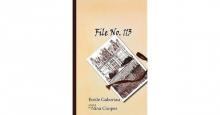 Le dossier no. 113. English
Le dossier no. 113. English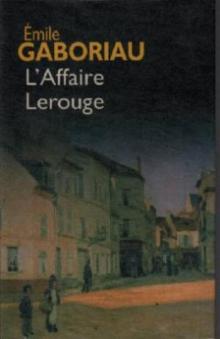 L'affaire Lerouge. English
L'affaire Lerouge. English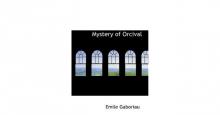 Le crime d'Orcival. English
Le crime d'Orcival. English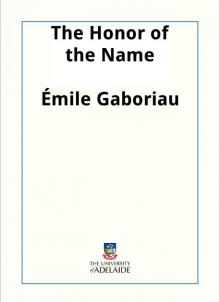 The Honor of the Name
The Honor of the Name The Count's Millions
The Count's Millions Caught in the Net
Caught in the Net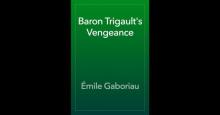 Baron Trigault's Vengeance
Baron Trigault's Vengeance La clique dorée. English
La clique dorée. English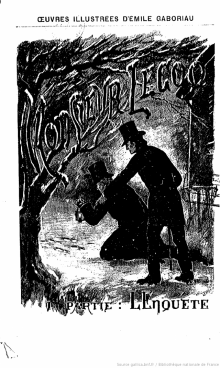 Monsieur Lecoq, v. 1
Monsieur Lecoq, v. 1 Within an Inch of His Life
Within an Inch of His Life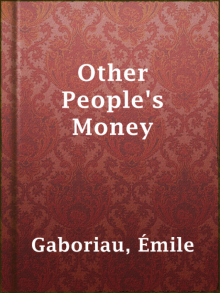 Other People's Money
Other People's Money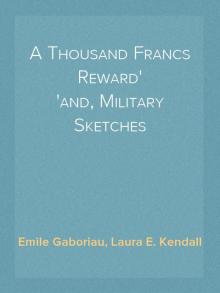 A Thousand Francs Reward; and, Military Sketches
A Thousand Francs Reward; and, Military Sketches